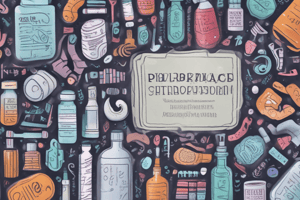Podcast
Questions and Answers
What type of adverse drug effect is characterized by an unintended result that occurs alongside the desired effect?
What type of adverse drug effect is characterized by an unintended result that occurs alongside the desired effect?
- Secondary effect
- Reference effect
- Toxic effect
- Side effect (correct)
Which classification of adverse drug effects indicates a life-threatening condition that requires intensive medical treatment?
Which classification of adverse drug effects indicates a life-threatening condition that requires intensive medical treatment?
- Severe (correct)
- Lethal
- Minor
- Moderate
What is defined as the body's physical dependence on a narcotic due to prolonged use?
What is defined as the body's physical dependence on a narcotic due to prolonged use?
- Withdrawal syndrome
- Dependence (correct)
- Rebound effect
- Intolerance
Which type of adverse drug reaction occurs when a drug causes another infection due to its primary effect?
Which type of adverse drug reaction occurs when a drug causes another infection due to its primary effect?
What is the term for the worsening of a condition after stopping a drug that had been providing therapeutic effects?
What is the term for the worsening of a condition after stopping a drug that had been providing therapeutic effects?
Which of the following is NOT considered an adverse drug reaction category?
Which of the following is NOT considered an adverse drug reaction category?
What effect is referred to when a drug reduces its own efficacy over time due to prolonged use?
What effect is referred to when a drug reduces its own efficacy over time due to prolonged use?
What type of adverse effect is characterized by an unplanned therapeutic failure despite proper drug use?
What type of adverse effect is characterized by an unplanned therapeutic failure despite proper drug use?
What type of adverse effect results from the prolonged use of laxatives leading to health complications?
What type of adverse effect results from the prolonged use of laxatives leading to health complications?
Which adverse drug effect is characterized by an exaggerated response to normal doses?
Which adverse drug effect is characterized by an exaggerated response to normal doses?
What is the typical outcome of antibiotic treatment concerning beneficial bacteria in the body?
What is the typical outcome of antibiotic treatment concerning beneficial bacteria in the body?
What adverse effect can occur from opioid overdose due to respiratory center inhibition?
What adverse effect can occur from opioid overdose due to respiratory center inhibition?
What describes the term 'superinfections' in relation to antibiotic use?
What describes the term 'superinfections' in relation to antibiotic use?
Which of the following best defines 'poisoning' in terms of drug effects?
Which of the following best defines 'poisoning' in terms of drug effects?
Which term refers to adverse effects that can occur after a significant delay following drug usage?
Which term refers to adverse effects that can occur after a significant delay following drug usage?
What defines dependence in the context of drug use?
What defines dependence in the context of drug use?
What characterizes Type A adverse drug effects?
What characterizes Type A adverse drug effects?
Which of the following is an example of a chronic adverse drug effect?
Which of the following is an example of a chronic adverse drug effect?
Which of the following scenarios best exemplifies a delayed adverse drug effect?
Which of the following scenarios best exemplifies a delayed adverse drug effect?
How are idiosyncratic reactions categorized in adverse drug effects?
How are idiosyncratic reactions categorized in adverse drug effects?
What is the main concern associated with Type C adverse drug effects?
What is the main concern associated with Type C adverse drug effects?
What describes the failure of therapy as an adverse drug effect?
What describes the failure of therapy as an adverse drug effect?
Which of the following is a characteristic of Type D adverse drug effects?
Which of the following is a characteristic of Type D adverse drug effects?
Which option reflects a common misunderstanding regarding side effects of medications?
Which option reflects a common misunderstanding regarding side effects of medications?
Flashcards are hidden until you start studying
Study Notes
Adverse Drug Effects
- Adverse Drug Reaction (ADR) is a harmful and unintentional response to a drug administered at normal doses.
- ADRs can lead to morbidity, mortality, and increased healthcare costs.
- The study of ADRs is called pharmacovigilance.
- ADRs are classified into six groups: Augmented Pharmacological Effects (Type A), Bizarre Effects (Type B), Chronic Effects (Type C), Delayed Effects (Type D), End-of-Treatment Effects (Type E), and Failure of Therapy (Type F).
Augmented Pharmacological Effects (Type A)
- Occur due to the known pharmacological actions of a drug.
- These effects are dose-dependent and predictable.
- They are usually well-known and quite frequent.
- They are generally associated with low to moderate consequences.
Bizarre Effects or Idiosyncratic (Type B)
- Genetically determined reactions characterized by an abnormal response to a drug.
- These effects are dose-independent and unpredictable.
- Two types of idiosyncratic reactions exist:
- Hypersensitivity reactions: Immune system response to a drug.
- Idiosyncratic reactions: Reactions that are not related to the known pharmacological actions of a drug.
Toxic Effects
- Result from excessive pharmacological action due to overdose or prolonged use/abuse of a drug.
- Example: Laxatives
- Prolonged laxative use can lead to electrolyte imbalance, dehydration, gastrointestinal distress, dependence, bowel damage, and kidney impairment.
Poisoning
- Caused by using high doses of a life-threatening substance (poison-drug) that severely alters vital functions.
- Example: Opioid overdose causing respiratory depression.
- Opioids bind to μ-opioid receptors in the brainstem, specifically in the medulla oblongata.
- The medulla oblongata controls automatic breathing rhythm.
Intolerance
- An adverse reaction to normal drug doses with an exaggerated response.
- The opposite of tolerance.
- Example: Metamizole
- Metamizole can cause intolerance in some patients, leading to severe allergic reactions or skin rashes despite being used at standard doses.
Tolerance
- Reduced response to a drug after repeated use, requiring higher doses to achieve the same effect.
- Prolonged use of narcotics can lead to physical dependence.
- When the drug is discontinued, the body reacts with withdrawal symptoms.
- Reducing narcotic dosage gradually minimizes withdrawal symptoms.
Failure of Therapy (Type F)
- Unexpected therapeutic failure despite correct dosage and duration of treatment.
- Examples:
- Contraceptive drugs: Unplanned pregnancy can occur despite correct use of oral contraceptives.
- Antibiotics: Persistent or recurring infections can happen despite antibiotic use (bacterial resistance).
Severity of Adverse drug Reactions
- Minor: No therapy or action required.
- Moderate: Requires modification in drug therapy or other complementary actions.
- Severe: Life-threatening condition causing permanent damage or requiring intensive medical treatment.
- Lethal: Directly or indirectly leading to patient death.
Types of Adverse Drug Reactions
- Side Effects: Unintended effects occurring alongside the desired therapeutic effect.
- They are common, unwanted, unavoidable, and occur at therapeutic doses.
- Reducing the dose can reduce the side effect.
- Side effects can be therapeutic in other contexts or for different patients.
- Example: Antihistamines and drowsiness.
- Secondary Effects: Indirect consequences of the primary action of the drug.
- Example: Antibiotics and superinfections.
Studying That Suits You
Use AI to generate personalized quizzes and flashcards to suit your learning preferences.




